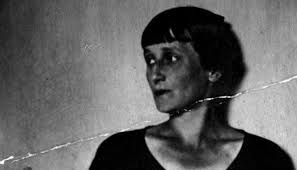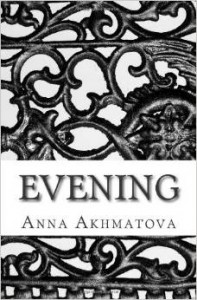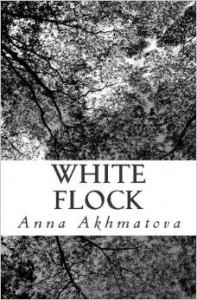She was born to an upper class family in what is now the Ukraine in 1889. Her father called her poetry decadent, but more as a commentary on poetry than his daughter. She married and had a son; he was raised by her in-laws with her husband’s agreement. She and husband divorced, although that didn’t help her when he was arrested and executed by the Soviets in 1921.
She would marry twice more; her third husband would die in a Siberian labor camp in 1953. Her son was imprisoned from 1949 to 1956. She would see her poetry published and then banned, published and then publication halted. For a long time, she could not publish poetry, and turned to essays and other non-fiction.
 Through enough tribulation to last several lifetimes, Anna Akhmatova continued to write poetry. She is now considered one of the icons of the Silver Age in Russian literature (roughly 1880 to 1920), associated with poets and writers like Alexander Blok and Boris Pasternak. In her own lifetime, she became a symbol of hope and survival to millions of Russians.
Through enough tribulation to last several lifetimes, Anna Akhmatova continued to write poetry. She is now considered one of the icons of the Silver Age in Russian literature (roughly 1880 to 1920), associated with poets and writers like Alexander Blok and Boris Pasternak. In her own lifetime, she became a symbol of hope and survival to millions of Russians.
It was because of her poetry and, I suspect, it was because even if they couldn’t read it, they knew she was still writing it.
While her first husband was in Africa, Akhmatova wrote the poems that were assembled and published in 1912 under the title of Evening. The poems brought instant celebrity in Russian literary circles (if not peace on the domestic front). Most are untitled; this one is especially haunting:

Passion, white-hot all through,
Neither one of us understood
How small the earth was for two,
That memory torments with spite,
Afflicting the most strong-hearted,
That one learns to plead in the night:
Where has my friend departed?
And as the choir voices rise,
Happy and menacing, that instant,
The same two stern and certain eyes
Survey the soul, persistent.
Ahkmatova was associated with a poetic movement called Acmeism, which observed a rigorous poetic form and was known for the directness of words. We might call it WYSIWYG today (What You See Is What You Get), but it’s also more than that, at least for Akhmatova’s poetry. The directness of the words (even reading them in English) begins, after a time, to evoke feelings, an atmosphere, something almost spiritual.
Her second volume of poetry, White Flock, published in 1917, is an example of that directness. The poems, many of which focus on nature and natural allusions, begin to assume the form of birds in a flock, collectively becoming something of wonder and beauty in the sky as you watch them fly and soar. Here is “White house, ” dated 1914, the year everything began to change for Russia, Europe and the world. It almost is looking forward to a time shortly later:

The soldiers march away.
I cannot feel my worry’s weight
This January day.
I recognize each branch in sight
And every silhouette,
In awe I watch the crimson light
Drip through the frosty net.
An off-white house stood here then,
Its porch encased with glass.
That bell-pull in my dead-white hand
How often did I grasp.
How often…Soldiers, no not stop,
Play on, I’ll find it still.
I’ll know it by its sloping top
And ivy that won’t wilt.
But someone had the house displaced
Into a helpful town
Or from my memory erased
The roadway to its grounds.
The snow, like cherry blossoms, fell
And bagpipes disappeared…
It seemed to me no one could tell
The house isn’t here.
One of the more modern collections of her poetry, Final Meeting: Selected Poems, contains the rather long poem, “Requiem, ” which does for the Stalinist regime in the Soviet Union in poetic form what Aleksandr Solzhenitsyn did with his fiction. It is an indictment and judgment of a regime that, despite its grotesque excesses and murderous ways, failed because of what it was ultimately unable to do—and that was to destroy the human spirit.
Anna Akhmatova was one of those human spirits that personal tragedy, revolution, civil war and totalitarianism could not destroy and could not silence. Her poetry, like her life, was the poetry of resilience.
Image by brunifia. Sourced via Flickr. Post by Glynn Young, author of the novels Dancing Priest and A Light Shining, and the recently published Poetry at Work (T. S. Poetry Press).
Want to brighten your morning coffee?
Subscribe to Every Day Poems and find some beauty in your inbox.
- Poets and Poems: Mary Brown and “Call It Mist” - September 18, 2025
- “Horace: Poet on a Volcano” by Peter Stothard - September 16, 2025
- Poets and Poems: The Three Collections of Pasquale Trozzolo - September 11, 2025

L. L. Barkat says
What I really like about Akhmatova is the simplicity of the images. I fell in love with her short poems in the large collection I read a few years back.
Megan Willome says
I am a big fan of the poetry of resilience. Thanks for introducing me to a new poet, Glynn.
Mary Sayler says
Thanks for focusing on Akhmatova’s poetry, Glynn. Your post reminded me to pull my copy of her poems (translated by Stanley Kunitz)from the shelf. Leafing through reminded me of what I love about her work: clarity and buoyancy!
So many poems by Christian poets in our country come across as petulant and cynical, but here’s a woman who experienced great hardships – physically, emotionally, and politically – and yet she wrote:
Everything is plundered, betrayed, sold,
Death’s great black wing scrapes the air,
Misery gnaws to the bone.
Why then do we not despair?
Indeed, why not? Love. She exhibited a strong love for her country, for God, for life and poetry, which kept her going and set an example for us to live and write with love, courage, and faith in Jesus’ Name.